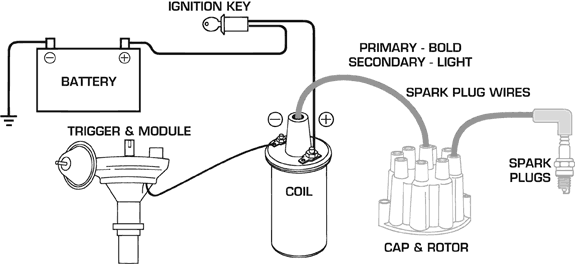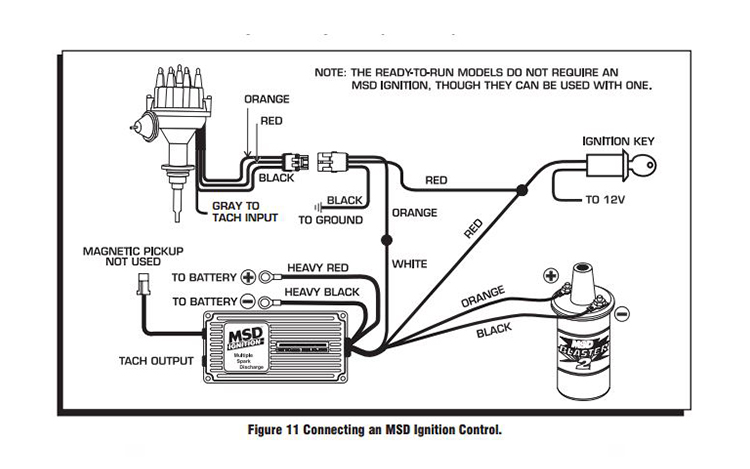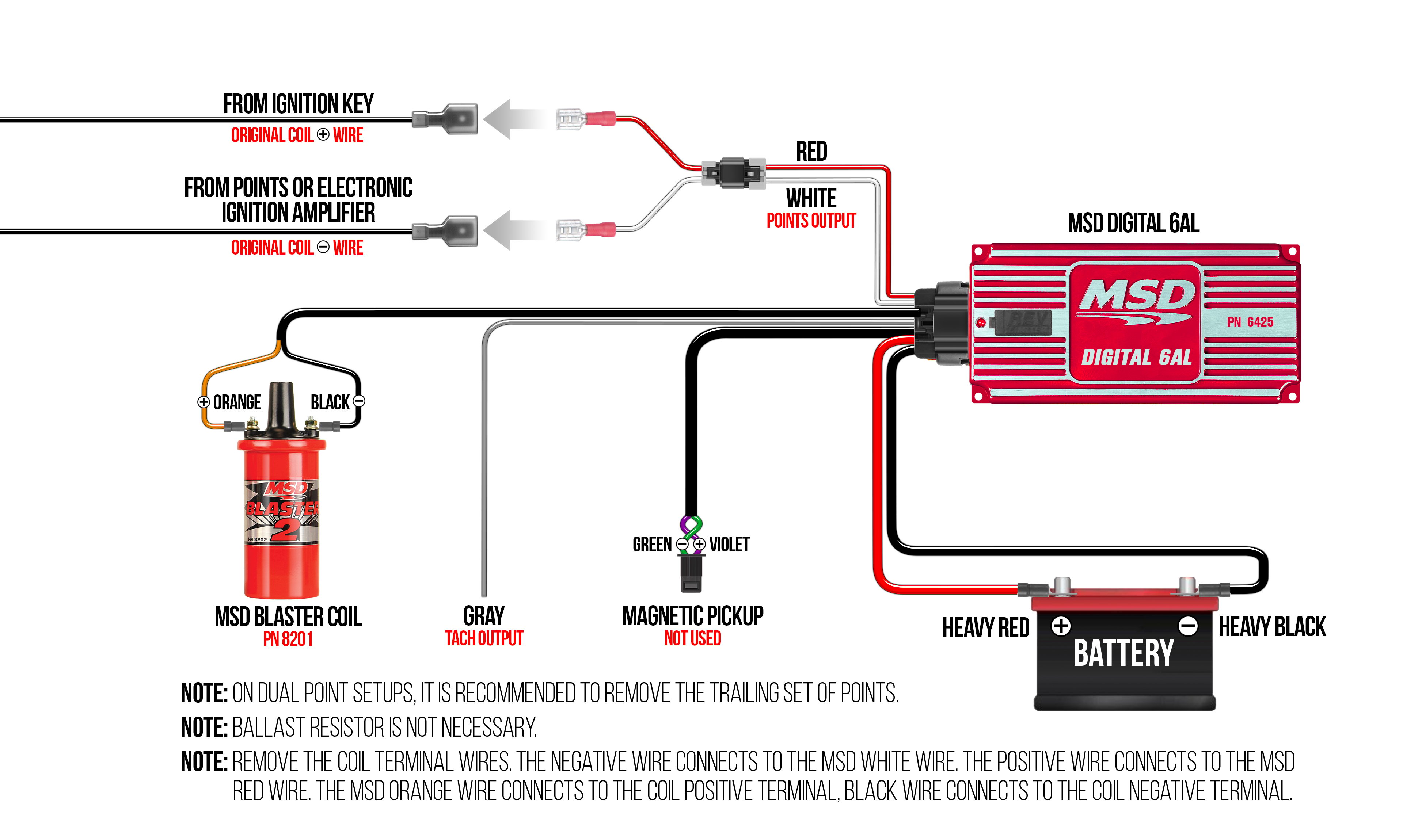<!doctype html>
Pontiac Ignition Systems
There have been vast improvements over the years in the area of ignition systems. The flow of electricity from the distributor through the wires and firing the spark plug in the cylinder for combustion is not as simple as it may seem. The spark must be powerful enough and timed perfectly to optimize the detonation in the cylinder. Advancements have been improved in distributors, more powerful coils, ignition boxes that produce a multi spark, and easier wiring and installation.
Ignition systems are composed of the following;
Distributor with attached gear driven by the camshaft. Contains a trigger for the coil (mechanical pickup, magnetic pickup, Hall Effect Switch, or Optical Trigger) most have an advance assemble where timing is adjusted via weights on and springs that are activated at certain rpm's, Rotor and cap used to accept the voltage from the coil and sent out through the terminals.
Ignition Coil for amplifying the voltage
Spark Plug Wires for delivering the voltage to the spark plug
Spark Plugs for igniting the compressed fuel in the cylinder
Optional CD Box for amplifying the voltage sent to the coil and also some provide multi-spark.

Common setup with an external coil and points or HEI distributor
Original Points Style
 Ignition points are a set of electrical contacts that switch the coil on and off at the proper time. The points are opened and closed by the mechanical action of the distributor shaft lobes pushing on them.
Ignition points are a set of electrical contacts that switch the coil on and off at the proper time. The points are opened and closed by the mechanical action of the distributor shaft lobes pushing on them.
Points Distributors are no longer produced due to the advancement in HEI and other style distributors. The need for higher voltage and energy for performance applications surpassed the capabilities of the Points style system. The mechanical contact point set was eventually replaced with an electronic pickup assembly that controlled spark firing using magnetic pulses. This eliminated the need for routine points maintenance. The points system would start to voltage fall when the engine reached about 1000 rpm where it was at it's maximum voltage.
Points Conversions
 There are several points conversion systems out there that use an electronic triggering system in place of the mechanical setup. An example of this is the Igniter III system from Pertronix. These deliver twice the voltage to the spark plugs, increasing horsepower, fuel economy, and spark plug life. 2:1 improvement over "points" in current fall time for increased coil output. Rotating cobalt magnets trigger a Hall Effect (more on this below) integrated circuit . ...no points to burn, ...no moving parts to wear out.
There are several points conversion systems out there that use an electronic triggering system in place of the mechanical setup. An example of this is the Igniter III system from Pertronix. These deliver twice the voltage to the spark plugs, increasing horsepower, fuel economy, and spark plug life. 2:1 improvement over "points" in current fall time for increased coil output. Rotating cobalt magnets trigger a Hall Effect (more on this below) integrated circuit . ...no points to burn, ...no moving parts to wear out.
HEI- High Energy Ignition

Integrated Coils- Our integrated coil HEI distributors negate the need to run an externally mounted coil. These make it the easiest ignition upgrade but the enlarged distributor housing size can cause fitment issues on some cars.
External Coils- Other HEI distributors do not build in the coil and require an external coil.
See Our Selection of HEI Distributors
Ignition Coils
 Coils are designed to take the low voltage form the battery and transform it into the voltage needed to create an electric spark in the spark plug. The coils come in a range of voltage and housing types. Current flows into the internal coil windings and creates a magnetic field. When it collapses on the secondary windings it induces high voltage and flows out to to fire the spark plug. This build up and collapse does take time they call "Dwell" which is expressed in crankshaft degrees.
Coils are designed to take the low voltage form the battery and transform it into the voltage needed to create an electric spark in the spark plug. The coils come in a range of voltage and housing types. Current flows into the internal coil windings and creates a magnetic field. When it collapses on the secondary windings it induces high voltage and flows out to to fire the spark plug. This build up and collapse does take time they call "Dwell" which is expressed in crankshaft degrees.
At some engine rpm point, the coil can't fully recharge before it becomes time to fire the next spark plug in the engine's firing order. One way around this is a capacitive discharge (CD) ignition system. As its name implies a "capacitive discharge" system uses a separate capacitor to store energy at a high voltage threshold which is then discharged through the ignition coil. More on CD boxes below.
Resistor Coils- The coils used in points systems were called resistor coils. It's purpose is to reduce the voltage (and therefore the current) flowing in the coil. That's the short answer. GM converted to 12-volt, the coils were 12-volt and externally resisted to reduce amperage during running but allowed full current to flow during startup.
The main difference in the coils besides voltage is resistance. Higher 1.5 and 3ohm coils are normally used in Points and inductive discharge ignitions. The lower ohm coils such as .7 , .38, and .355ohm coils are used in capacitive discharge (CD) systems but can be used in inductive systems and points style using a ballast resistor.
See Our Selection of Ignition Coils
CD-Capacitive discharge (CD) Systems
 These boxes are are capable of producing full power sparks throughout the entire rpm range. It draws its energy directly from the battery where a custom wound transformer steps it up to over 460 volts. This voltage is then stored in a capacitor until the ignition is triggered. At this point, all of the voltage is dumped into the coil where it is transformed into even more voltage, anywhere from 30,000 - 60,000 volts depending on the coil, which is sent to the distributor and finally to the plugs. The ability to produce high power sparks throughout the entire rpm range of your engine is why you need a CD ignition. The payoff is complete combustion of the fuel mixture which results in more power, increased throttle response, a smooth idle, quick starts, improved economy and reduced plug fouling. All engines will benefit from a CD ignition but when you’re planning on engine modifications.
These boxes are are capable of producing full power sparks throughout the entire rpm range. It draws its energy directly from the battery where a custom wound transformer steps it up to over 460 volts. This voltage is then stored in a capacitor until the ignition is triggered. At this point, all of the voltage is dumped into the coil where it is transformed into even more voltage, anywhere from 30,000 - 60,000 volts depending on the coil, which is sent to the distributor and finally to the plugs. The ability to produce high power sparks throughout the entire rpm range of your engine is why you need a CD ignition. The payoff is complete combustion of the fuel mixture which results in more power, increased throttle response, a smooth idle, quick starts, improved economy and reduced plug fouling. All engines will benefit from a CD ignition but when you’re planning on engine modifications.
Conventional CD ignitions supply one spark of intense energy but for a short duration (time). MSD uses multiple sparking technology to take advantage of the quick rise time and power of a CD Ignition by producing a series of sparks. More sparks equal more heat in the combustion chamber resulting in complete combustion of the fuel mixture which produces more power. At lower rpm, there are many benefits to multiple sparks including a smooth idle, improved throttle response plus the spark series prevents fouling plugs or fuel loading up in the cylinder when air/fuel distribution is poor. The multiple spark series of an MSD Ignition Control lasts for 20° of crankshaft rotation. At lower rpm, 1,000 rpm for example, there is plenty of time to fire the plug a number of times to ensure ignition of the fuel mixture. As rpm increases, the piston travels up on the compression stroke faster resulting in a shorter amount of time available to fire the plug so the number of sparks that occur decreases. By about 3,000-3,300 rpm, there is only enough time to fire the plug once. From about this rpm range on, an MSD ignition control delivers one intense, full power spark.
Ready to Run Distributors
 The ready to run are exactly as they sound and ready to run with minimal requirements for installation. Inside the housing there is an ignition module that produces a much hotter spark which will improve the performance of your engine. This eliminates the need for a separate CD box. All that is required is to install this distributor in the engine, connect three wires and the coil. These are the perfect upgrade for outdated points distributors or bulky HEI's.
The ready to run are exactly as they sound and ready to run with minimal requirements for installation. Inside the housing there is an ignition module that produces a much hotter spark which will improve the performance of your engine. This eliminates the need for a separate CD box. All that is required is to install this distributor in the engine, connect three wires and the coil. These are the perfect upgrade for outdated points distributors or bulky HEI's.
See our Ready to Run Distributors
Pro Series Distributors
 These distributors do not contain an integrated ignition module and must be controlled with an external CD box. Designed for street performance or racing applications. These normally have an extremely accurate magnetic pickup that never requires adjustment along with an easy to adjust mechanical advance mechanism.
These distributors do not contain an integrated ignition module and must be controlled with an external CD box. Designed for street performance or racing applications. These normally have an extremely accurate magnetic pickup that never requires adjustment along with an easy to adjust mechanical advance mechanism.
See our Pro Series Distributors
Dual Sync Distributors- for EFI Systems with timing control
 Dual Sync Sensors generate two signals, one for crank and one for cam. Using this setup allows for individual timing control when using ignition boxes. These distributors have what is called a "Hall Effect" sensor. In simple terms, the Hall effect is used to detect the position of a rotating part in the engine and then send a signal to the ignition coil to generate a spark at the right time.
Dual Sync Sensors generate two signals, one for crank and one for cam. Using this setup allows for individual timing control when using ignition boxes. These distributors have what is called a "Hall Effect" sensor. In simple terms, the Hall effect is used to detect the position of a rotating part in the engine and then send a signal to the ignition coil to generate a spark at the right time.
Improved Timing Accuracy: The Hall effect distributor provides improved timing accuracy as compared to other types of distributors. This is because it uses a magnetic sensor to detect the position of the reluctor wheel, which is more accurate than the mechanical systems used in other types of distributors.
See our Dual Sync / HyperSpark Distributors
Holley Hyperspark and Dual Sync distributors are plug and play compatible with Holley Sniper EFI Systems, EFI CD Boxes, and EFI Coils making them an ease to install.
Pontiac Ignition Systems

Click here to shop our Ignition Kits
Distributor Gears
 Most distributors are shipped with steel gears. We recommend using a bronze or polymer gear for hyd roller applications. With the polymer you never have to worry about metal shavings in your oil again. Shaft sizes include .491-inch for stock applications (Use with Factory GM HEI / Points & Mallory / Mallory Must Be Drilled for Larger Dia Pin) and .500-inch for aftermarket (MSD, Pertronix, Holley, FAST Dist). Check your shaft diameter to confirm size.
Most distributors are shipped with steel gears. We recommend using a bronze or polymer gear for hyd roller applications. With the polymer you never have to worry about metal shavings in your oil again. Shaft sizes include .491-inch for stock applications (Use with Factory GM HEI / Points & Mallory / Mallory Must Be Drilled for Larger Dia Pin) and .500-inch for aftermarket (MSD, Pertronix, Holley, FAST Dist). Check your shaft diameter to confirm size.
Click Here for Distributor Gears
FAQ- Frequently Asked Questions
Q. What is the best spark plug and plug gap for my application?
A. On NGK the lower the #, the hotter the plug is. (Example- -6 is a hotter plug than -9). Other brand plugs may be listed opposite.
General Guideline- Pump gas street engines would use a -5 to -7 heat range, high compression race engines may use a -8 or -9 heat range, and boosted/nitrous engines may use a -9 or -10 heat range depending on levels of boost/nitrous.
Spark plug gap for Points is .035 and any electronic or MSD is .040-.045
Q. Do I need a ballast resistor coil?
A. You don’t need a ballast resistor if you are using an Ignition Control box (CD), a ready to run distributor ( ignition control based distributor). If you are using a points system with a coil a ballast resistor is required.
Q. Can an aftermarket ignition system work with my factory or hood tach?
A. Most Pontiac factory tachs are made to use with a points or HEI distributor. For use with magnetic pickup ignitions such as ready to run or an external CD ignition box, you will need to use a Tach adapter. (MSD-8920)



You must login to post comments.